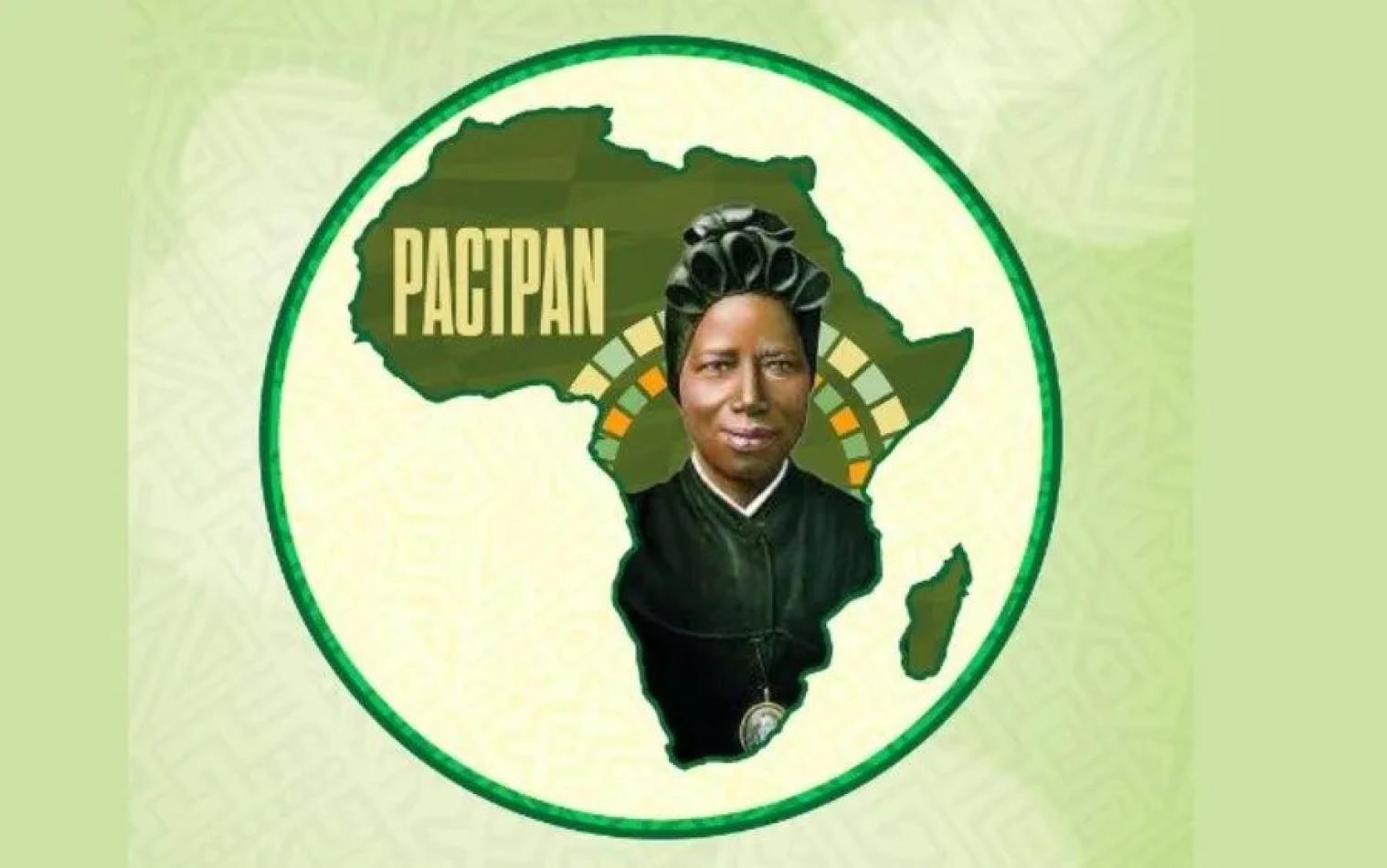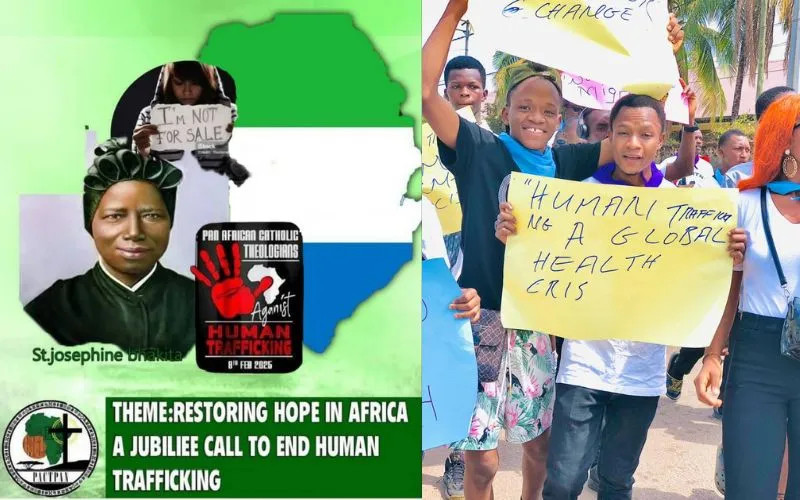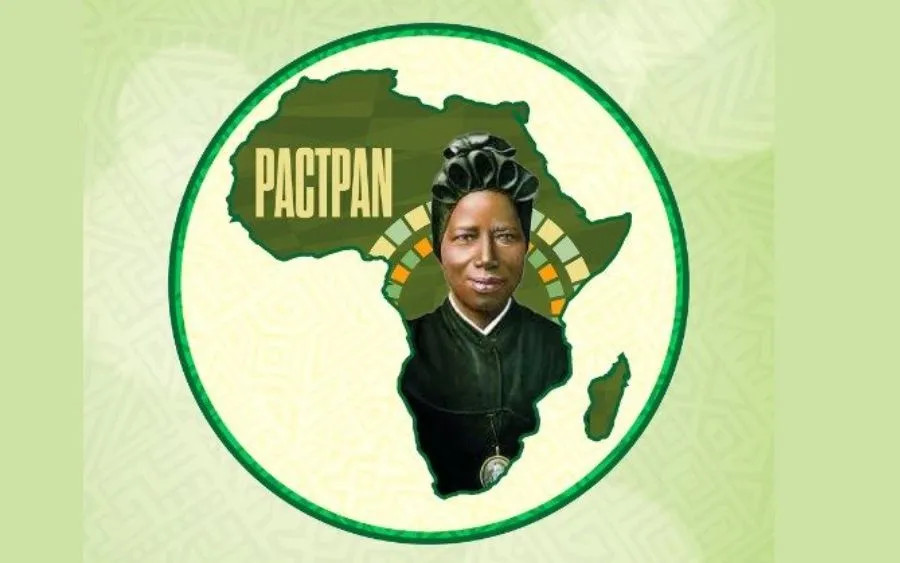Daniel Comboni
Comboni Missionaries
Institutional area
Other links
Newsletter
Friday, February 7, 2025
Over 30 African countries have confirmed their participation in the February 8 campaign to end human trafficking, which the Pan-African Catholic Theology and Pastoral Network (PACTPAN) has organized. February 8, the Feast Day of St. Josephine Bakhita, a former slave of Sudanese descent and Patron Saint of victims of human trafficking, is designated for prayer and awareness against the menace of human trafficking. [ACI Africa]
St. Bakhita Feast Day Stirs Renewed Fight against Human Trafficking
in over 30 African Countries
This year, over 30 countries in Africa are to celebrate Holy Mass in what is probably one of the biggest campaigns PACTPAN theologians have organized to create awareness against human trafficking. Peaceful marches have also been organized in the countries that have confirmed their participation in the campaign to undertaken under the theme, “Restoring Hope in Africa: A Jubilee Call to End Human Trafficking”.
Uganda’s Vice President, Jessica Rose Epel Alupo, is set to deliver a keynote address on the theme of the campaign. In the whole of East Africa in particular, Uganda has been said to be the most hospitable to refugees, especially from South Sudan; some of them are victims of human trafficking. Coordinating the campaign is PACTPAN’s Director of Programs, Sr. Leonida Katunge, who shared details of the event with ACI Africa.
The member of the Sisters of St. Joseph of the Catholic Archdiocese of Mombasa, (SSJ Mombasa) said that a total of 22,500 members from 35 countries have already registered to take part in the campaign physically through peaceful demonstrations and prayer events. Out of the 35 countries, only 10 will not be taking part in physical gatherings owing to political instabilities they are experiencing, Sr. Katunge told ACI Africa on January 29.
“We have up to 10 countries where members will not go to the streets due to their current political upheavals. These include the Democratic Republic of Congo where there is widespread violence. These countries will follow the live stream on the PACTPAN YouTube channel,” she said, and added, “We are out to walk together, even on social media platforms, to fight this war.”
Countries that have shared their programs for the campaign, especially on the Feats Day of St. Bakhita include Nigeria, Sierra Leone, Zambia, Lesotho, Cameroon, Tanzania, and Senegal. In South Sudan, Giningakpio Justin Dapu, who is organizing the PACTPAN campaign in the Catholic Diocese of Tombura-Yambio (CDTY) told ACI Africa that over 1,000 people in the South Sudanese Diocese have already registered for the mega event.
“We have mobilized 1,300 people who will participate in the campaign on the 8th of February. We have formed a team of 35 very well trained and knowledgeable people who are in charge of the logistics of the campaign. They are the ones in charge of ground preparation, awareness creation and mobilization,” Dapu said in the January 29 interview. He said the people of God in South Sudan, the world’s newest nation which used to be part of Sudan specifically feel enjoined in the celebration of the Feast Day of St. Bakhita. “In fact, as part of our campaign against human trafficking, we plan to start a devotional group named St. Bakhita to deeply seek her intersession in this fight,” Dapu further said.
Highlighting the events leading to the February 8 campaign, and the rallying of over 30 countries to participate in the event, Sr. Katunge said, “We began by calling for a webinar through various networks where I am a member. I then had some human trafficking survivors speak to us. Then we thought it wise to involve the continent and this is what basically we did since December 2024, and we are still struggling to get there.”
Sr. Katunge told ACI Africa that PACTPAN has, over the years, invested in grassroots collaborations to address issues affecting African communities, such as human trafficking. She said that PACTPAN’s shared vision of addressing human trafficking resonated with many African leaders, adding that the Catholic Church’s 2025 Jubilee Year also inspired widespread participation.
The Catholic Nun who headed the national steering committee for Kenyan participants in the dialogue between Pope Francis and the African youths explained that the campaign against human trafficking is deeply connected to the theme of the 2025 Jubilee Year, “Pilgrims of Hope”. “We are basing ourselves on the Gospel of Luke’s call to liberation, and justice for all captives and, this time, those tied to modern slavery,” Sr. Katunge said in the January 29 interview with ACI Africa.
She said that the PACTPAN campaign embodies the call for freedom by addressing modern-day slavery and exploitation, encouraging healing, and fostering hope among communities in Africa. Describing the dire human trafficking situation in Africa, the Catholic Nun who is a practicing Advocate of the High Court of Kenya and majors on property law and family law highlighted cases of forced labour, sexual exploitation, child trafficking, as well as organ harvesting, a vice she said is “getting worse day after day”.
“During my research and the documentary compilation, I listened to many cases of trafficking of women from West Africa to Europe and the Middle East,” Sr. Katunge said of the documentary she compiled in May 2024, also showcasing exploitation of children in conflict zones.
PACTPAN’s planned march against human trafficking organized in partnerships with church networks, NGOs, youth organizations, and governmental agencies will feature a clear itinerary, including starting points in key African cities, messages of hope, prayers, and moments of silence for victims. “Logistics such as transportation, security, and media coverage are being handled collaboratively and locally to ensure success,” Sr. Katunge said.
According to the Kenyan member of the SSJ Mombasa, the participation of a Vice President in the campaign brings significant credibility, visibility, and influence to the event. “It demonstrates high-level political commitment, encouraging other leaders to prioritize anti-trafficking efforts, and amplifies the campaign’s reach across national and regional levels,” Sr. Katunge told ACI Africa.
PACTPAN has lined up various other activities in the context of the 2025 Jubilee Year celebrations to raise awareness against human trafficking in Africa. According to the PACTPAN’s Director of Programs, “The campaign runs to 2030 and the war goes on.”
“We will take part in the UN day for trafficked persons on the 30th of July from this year until 2030. We plan to have a continental team that will fight this war in these years,” Sr. Katunge said. She further divulged that there will be interfaith prayers for victims of human trafficking, workshops to educate communities on identifying trafficking networks, as well as fundraising events to support survivors.
Policy forums are also to be held to advocate for stricter anti-trafficking measures, Sr. Katunge said, adding that cultural festivals will also be held to promote unity and hope during the 2025 Jubilee Year, which Pope Francis officially launched on 2024 Christmas Eve with the opening of the Holy Door of St. Peter’s Basilica of Rome.
The PACTPAN official said that the network of African theologians also plans to have a center in Africa where young people, especially girls, will be equipped with skills to shield them from traffickers. “Telling these girls to stop going to these countries where they are trafficked is one thing. But how are we supporting them if they stay?” she posed, and continued, “We want to collaborate with the States to keep these young people at home and to provide them with training and jobs. It is possible and we are sure we will get there.”
Agnes Aineah – ACI Africa
Four Lessons from St. Josephine Bakhita, Kidnapped as a Child in Sudan:
A Kenyan Sister’s Reflection
February 8 is the Feast Day of St. Josephine Bakhita, a former slave of Sudanese descent and Patron Saint of victims of human trafficking. As the Church celebrates the feast day of St. Bakhita, a Kenyan Catholic Nun bearing the saint’s name reflects on the life of her prototype which she says “mirrors the direction our lives should take as today’s Christians.”
According to Sr. Josephine Bakhita, an official at the Pan-African Catholic Theology and Pastoral Network (PACTPAN), St. Bakhita’s life provides key lessons on the dignity of life human in today’s world where she says trafficking remains a global crisis, with millions of men, women, and children forced into labor and exploitation.
She hails the team of African theologians at PACTPAN who have organized a mega campaign in over 30 African countries to end human trafficking. The member of The Sisters of Mary of Kakamega who serves at PACTPAN’s “Church of Now” says that the feat of St. Josephine Bakhita is a reminder of endurance and total trust in God amid hardships, the power of forgiveness as well as generosity.
“The feast of St. Josephine mirrors the direction our lives should take as today's Christians. Her extraordinary life provides lessons that we can emulate in addressing the pressing challenges of our time. This journey from slavery to sanctity provides a profound Christian perspective on human trafficking, suffering, domestic violence, food insecurity and flawed healthcare system. Her life serves as a beacon of hope, inspiring us to respond with faith, love, and action,” Sr. Bakhita says in the reflection she shared with ACI Africa on Thursday, February 6, ahead of the February 8 feat day.
Here is the rest of her reflection:
The need to uphold the dignity of every person
The early life of St. Josephine Bakhita was marked by the horrors of human trafficking. She was kidnapped as a child in Sudan, sold multiple times, endured unimaginable suffering in the hands of those with no sympathy or dead conscience. Despite the horrors, she found freedom in Christ and forgave those who had wronged her.
Today, human trafficking remains a global crisis, with millions of men, women, and children forced into labor and exploitation. As Christians, we are called to recognize and uphold the dignity of every person, just as St. Josephine Bakhita did. Thanks to church organizations that educate communities about the dangers of trafficking, provide safe houses for survivors, and advocate for policies that protect the vulnerable or those at risk. These sanctuaries offer not only shelter but also spiritual and psychological healing for victims. The question is: how can these individuals be supported to sustain this noble mission, and how can efforts be escalated to ensure that every victim is reached? The story of St. Josephine Bakhita reminds us that every victim deserves restoration and that our faith calls us to be their voice.
Suffering and Trust in God
St. Josephine Bakhita endured immense suffering, yet she remained steadfast, focused and determined in following her faith to the latter. After gaining freedom, she entered the Canossian order, giving her total life to love and serve her master through prayer and humble duties. With love she echoed, “If I were to meet the slave traders who kidnapped me, and even those who tortured me, I would kneel and kiss their hands. For, if these things had not happened, I would not have become a Christian.” Her words reflect a remarkable degree of trust in God’s divine plan for mankind.
In today’s world, countless people suffer due to illness, economic struggles, and injustice. Cancer patients endure unbearable pain along with the financial strain of expensive therapy. Many communities survive on just one meal a day, and the lack of affordable healthcare remains a pressing issue, leaving the sick without proper medical attention. Encouraged by the life of St. Bakhita, we are called to help them see suffering through the lens of faith, trusting that God can transform pain into a path of grace. As Christians, we can follow her example by accompanying the suffering—whether through prayer, acts of kindness, or simply being present. This can be seen in a priest providing spiritual comfort to the sick, a nun dedicated to nursing a chronically ill patient, or a brother sharing the little bread left for supper. In these small yet profound ways, we remind those in need that God is with them, even in their suffering. By embracing this mission, we become models of hope, advocating for accessible healthcare, supporting medical missions, and standing with the sick through prayer and compassionate action. In doing so, we not only bring relief to those in distress but also bear witness to the love and mercy of Christ in a broken world.
Domestic Violence and the Power of Forgiveness
St. Josephine Bakhita’s early years were marked by cruelty, yet she never allowed bitterness to define her. Her capacity to forgive her oppressors is a testament to the Christian call to love even our enemies. This lesson is particularly relevant today, as domestic violence remains a significant issue in many communities. Women and children around the world suffer in abusive relationships, often feeling trapped and powerless. Even within the Church, some cases of domestic violence remain hidden behind walls of silence. The weight of pastoral responsibilities, personal struggles, and societal pressures can sometimes challenge even the most dedicated priests and religious, affecting their interactions with those entrusted to their care. Likewise, devout members of the Church may endure suffering quietly, fearing judgment or economic dependence on their abusive spouses. St. Bakhita’s story encourages us to seek healing and liberation. As a family of God, we must stand together to advocate for social justice, offer spiritual and emotional renewal, and provide a listening ear to those in need, embodying Christ’s compassion. Inspired by her life, we are called to foster environments of peace and protection, ensuring that no one suffers in silence.
Friend, inspire before you expire!
Food Shortages and Christian Generosity
St. Josephine Bakhita knew the pain of deprivation, having endured hunger and neglect during her years of slavery. Today, food insecurity remains a growing concern, with millions facing malnutrition due to conflicts, economic instability, and climate change. Many young people are pushed into desperate situations—early marriages, cults, or even crime—simply to survive.
As Christians, we have a vital role in feeding the hungry. But how do we respond? Do we recognize the moments when we have more than enough, even to the point of waste? Do we give out of genuine love, or only when we expect something in return? St. Bakhita’s experience reminds us that true generosity is not just about providing food but about sharing with love and dignity, recognizing the inherent worth of every person we serve. A beautiful example is Pope Francis’ advocacy for the poor. Through initiatives such as the annual World Day of the Poor, he calls on Catholics worldwide to engage in acts of mercy. Inspired by St. Bakhita, we too can make a difference—by donating, volunteering, or simply being mindful of waste and excess in our own consumption. Let us reflect, act, and ensure that no one goes hungry while we have the ability to share.
In conclusion, as we celebrate St. Josephine Bakhita’s feast day, we are reminded that her story is not just one of past suffering but of present relevance. Her life calls us to stand against human trafficking, to trust in God during hardships, to foster safe environments free from violence, and to practice generosity towards the hungry. May her intercession guide us in making the world a place of greater justice, love, and faith. Amen.
Agnes Aineah – ACI Africa






